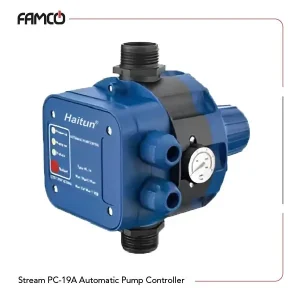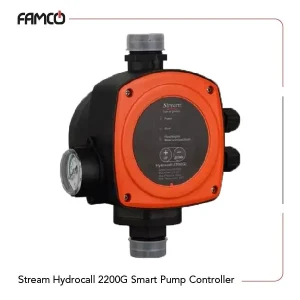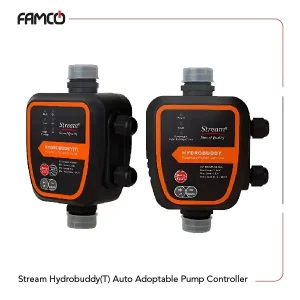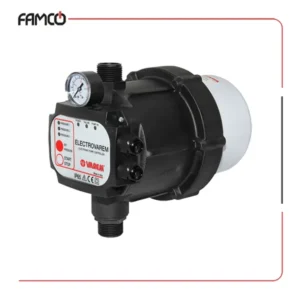Automatic Water Pump (Automatic Pressure Controller)
Efficiency meets reliability with our state-of-the-art Automatic Pump Controller (Automatic Pressure Controller). Seamlessly integrating advanced technology with intuitive functionality, our controller is the cornerstone of effortless water management. Whether it’s maintaining optimal pressure levels or safeguarding against potential issues, our solution empowers you with precision control, ensuring uninterrupted water flow with every activation. Welcome to a new era of convenience and peace of mind in pump management.
Types of automatic pump controller
Automatic pump controllers or automatic pressure controllers come in various types, each tailored to specific needs and applications:
- Pressure Switch Controllers: These controllers activate the pump when a drop in pressure is detected in the water system, ensuring consistent pressure levels are maintained.
- Float Switch Controllers: Utilizing floats, these controllers automatically activate the pump when the water level reaches a certain point, ideal for applications such as drainage or wastewater management.
- Electronic Pressure Controllers: Offering precise control over pressure levels, these controllers use sensors and electronic circuitry to monitor and adjust pump operation, optimizing performance and energy efficiency.
- Level Sensing Controllers: Designed for applications where maintaining specific water levels is critical, these controllers activate the pump based on water level sensors, ensuring precise control over fluid levels in tanks or reservoirs.
- Timer-based Controllers: These controllers allow for pre-programmed scheduling of pump operation, enabling automated activation at set intervals, ideal for applications such as irrigation systems or periodic water supply.
- Variable Frequency Drive (VFD) Controllers: Offering advanced control over pump speed and power consumption, VFD controllers adjust motor speed based on system demands, maximizing energy efficiency and extending equipment lifespan.
Automatic pump controller Price List
Several factors can influence the price of automatic pump controllers:
- Type and Complexity: The type of controller and its complexity significantly impact the price. Advanced controllers with sophisticated features such as electronic pressure regulation or variable frequency drives typically command a higher price compared to simpler models like pressure switch controllers.
- Brand and Reputation: Established brands with a reputation for quality and reliability may price their controllers higher due to brand value and customer trust. However, lesser-known brands or generic products might offer more budget-friendly options.
- Features and Specifications: Additional features such as built-in surge protection, overload protection, digital displays, remote monitoring capabilities, and compatibility with specific pump types can affect the price. Controllers with more features generally come at a higher cost.
- Material Quality and Durability: The quality of materials used in construction, such as durable enclosures and corrosion-resistant components, can influence the price. Controllers built to withstand harsh environments or heavy-duty usage may have a higher price tag.
- Certifications and Compliance: Controllers that meet industry standards and regulations, such as UL (Underwriters Laboratories) certification or compliance with specific safety standards, may be priced higher due to the additional testing and certification processes involved.
- Warranty and After-Sales Support: The length and comprehensiveness of the warranty offered by the manufacturer, as well as the availability of reliable after-sales support and technical assistance, can impact the overall value proposition and, consequently, the price.
- Market Demand and Supply: Fluctuations in market demand and supply dynamics, as well as external factors such as currency exchange rates and raw material costs, can influence pricing strategies adopted by manufacturers and distributors.
- Distribution Channel: The distribution channel through which the controller is sold can also affect its price. Controllers sold directly by manufacturers may be priced differently compared to those sold through wholesalers, retailers, or online marketplaces, each of which may add their margin to the final price.
You can check automatic pump controller price on Famcocorp website.
How to choose the right automatic pump controller for your needs?
Choosing the right automatic pump controller requires careful consideration of several factors to ensure it meets your specific needs and requirements. Here’s a step-by-step guide to help you make the right decision:
- Understand Your Application: Begin by identifying the specific application for which you need the pump controller. Whether it’s for residential water supply, agricultural irrigation, industrial processes, or wastewater management, understanding the intended use will guide your selection process.
- Assess Pump Type and Specifications: Determine the type and specifications of the pump(s) you’ll be using with the controller. Consider factors such as flow rate, pressure requirements, horsepower, voltage, and compatibility with different pump types (centrifugal, submersible, etc.).
- Evaluate Control Method: Decide on the most suitable control method based on your application requirements. Options include pressure switch control, float switch control, electronic pressure control, level sensing control, timer-based control, or variable frequency drive (VFD) control. Choose a method that aligns with your desired level of automation and precision.
- Consider Additional Features: Determine if you need any additional features or functionalities in the pump controller, such as surge protection, overload protection, digital displays, remote monitoring capabilities, fault diagnostics, or compatibility with external sensors and devices.
- Assess Environmental Conditions: Consider the environmental conditions in which the pump controller will operate. Factors such as temperature extremes, humidity, exposure to water or chemicals, and the presence of dust or debris can influence the choice of controller and its durability requirements.
- Review Brand Reputation and Quality: Research reputable brands known for manufacturing reliable and high-quality pump controllers. Look for customer reviews, ratings, and testimonials to gauge the reputation and satisfaction levels associated with different brands and products.
- Check Certifications and Compliance: Ensure that the pump controller meets relevant industry standards and regulations, such as UL (Underwriters Laboratories) certification or compliance with specific safety and performance standards. Certifications provide assurance of quality, reliability, and safety.
- Evaluate Warranty and Support: Review the warranty terms offered by the manufacturer, including coverage duration and scope. Additionally, consider the availability of reliable after-sales support, technical assistance, and spare parts availability, as these factors can affect long-term satisfaction and maintenance costs.
- Compare Prices and Value Proposition: Finally, compare the prices of different pump controllers with similar features and specifications to assess their value proposition. Choose a controller that offers the best balance of performance, features, reliability, and affordability within your budget constraints.
Automatic pump controller components
The key components of an automatic pump controller typically include:
- Control Panel: Houses the circuitry and controls for the pump, including switches, relays, and electronic components.
- Sensors: Depending on the type of controller, sensors such as pressure switches, float switches, level sensors, or electronic pressure sensors are used to detect changes in pressure or water levels.
- Power Supply: Provides electrical power to the controller and the connected pump motor.
- Enclosure: Protects the internal components from environmental factors such as moisture, dust, and debris.
- Wiring: Connects the controller to the pump motor, power supply, and any external sensors or devices.
- User Interface: Depending on the controller’s features, there may be a user interface such as buttons, knobs, or a digital display for setting parameters and monitoring operation.
Advantages and features of automatic pump controller
The advantages and features of automatic pump controllers include:
- Efficiency: Automatic pump controllers optimize pump operation by activating it only when needed, reducing energy consumption and extending the lifespan of the pump.
- Convenience: They provide hands-free operation, eliminating the need for manual intervention to start or stop the pump, thus saving time and effort.
- Consistent Pressure: Controllers maintain consistent water pressure levels within the desired range, ensuring reliable water supply for various applications.
- Protection: Advanced features such as overload protection, surge protection, and dry run protection safeguard the pump from damage caused by electrical faults, power surges, or running dry.
- Customization: Many controllers offer adjustable settings and parameters, allowing users to customize operation based on specific requirements and preferences.
- Compatibility: They are compatible with different types of pumps, including centrifugal, submersible, and booster pumps, making them versatile for various pumping applications.
- Automatic Restart: Some controllers feature automatic restart functionality, resuming pump operation after power outages or system resets without the need for manual intervention.
- Remote Monitoring: Advanced controllers may offer remote monitoring capabilities, allowing users to monitor pump status, performance metrics, and fault alerts from a distance using smartphones or computers.
- Diagnostic Features: Controllers with built-in diagnostic features can detect and report issues such as low water levels, pump faults, or system malfunctions, facilitating timely maintenance and troubleshooting.
- Water Saving: By maintaining optimal pressure levels and preventing water wastage, automatic pump controllers contribute to water conservation efforts and lower utility bills.
You can buy automatic pump controller online from Famcocorp website.















